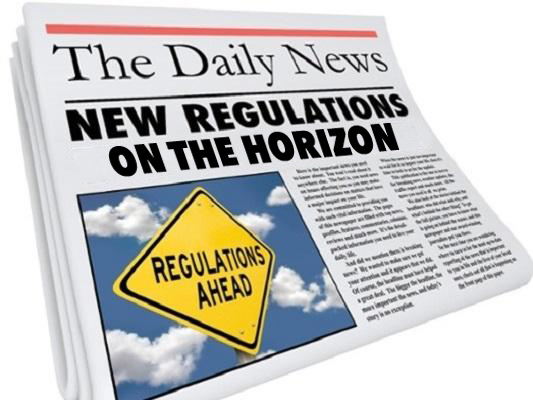 Spring Rulemaking Agendas A number of regulatory agencies have recently issued their spring rulemaking agendas. A review of these agendas can provide the credit union with insight on what potential compliance changes are on the horizon, which can assist with strategic planning for compliance resources, as well as products and services that the credit union offers or plans to offer in the future. While obviously it is just an agenda and subject to change, with new leadership at the CFPB it is good to see what is on their mind in terms of regulatory hot topic areas. CFPB’s Agenda The Consumer Financial Protection Bureau (CFPB) recently posted their Spring 2022 rulemaking agenda. The relatively short list can be found here. One item that has been top of mind for many credit unions is the rulemaking concerning Section 1071 of the Dodd-Frank Act, or small business lending data collection. This is subject to change, but the anticipated final rule is expected to be issued by March 2023. Two items on the proposed rulemaking agenda: PACE financing and AVMs. With regard to PACE financing - Section 307 of the Economic Growth, Regulatory Relief, and Consumer Protection Act (EGRRCPA) directs the CFPB to issue regulations relating to "Property Assessed Clean Energy” (PACE) financing. As defined in EGRRCPA section 307, PACE financing results in a tax assessment on a consumer’s real property and covers the costs of home improvements. The required regulations must carry out the purposes of TILA’s ability-to-repay (ATR) requirements, currently in place for residential mortgage loans, with respect to PACE financing, and apply TILA’s general civil liability provision for violations of the ATR requirements the Bureau will prescribe for PACE financing. A notice of proposed rulemaking is anticipated for May 2023. The CFPB is participating in interagency rulemaking processes with the Board of Governors of the Federal Reserve System, the Office of the Comptroller of the Currency, the Federal Deposit Insurance Corporation, the National Credit Union Administration, and the Federal Housing Finance Agency (collectively, the Agencies) to develop regulations to implement the amendments made by the Dodd-Frank to the Financial Institutions Reform, Recovery, and Enforcement Act of 1989 (FIRREA) concerning appraisals automated valuation models. The FIRREA amendments require implementing regulations for quality control standards for automated valuation models (AVMs). A notice of proposed rulemaking is anticipated for December 2022. CFPB Director Rohit Chopra recently wrote a blog post on “rethinking the approach to regulations” which provides some insight into Director Chopra’s thoughts on rulemaking. The blog post explains, “Regulators have historically issued overly complicated and tailored rules for the existing regulatory landscape, as opposed to providing basic bright-line guidance and rules that can withstand evolution of the marketplace over time. The CFPB aspires to more clearly communicate the agency’s expectations in simple and straight-forward terms, which will produce more durable guidance and rules, in addition to numerous other benefits. While this task is difficult, we believe it is important to move away from the failed approach of the past.” NCUA’s Agenda The National Credit Union Administration (NCUA) also issued their Spring 2022 rulemaking agenda, which can be found here. In the “final rule” stage, the agenda lists eleven possible final rules that might be issued (all subject to change). One item on the final rulemaking list has already been completed, specifically, the final rule for Q&A regarding private flood insurance was already issued. Other possible final rules include topics such as succession planning, overdraft policy, bank secrecy act and combination transactions with non-credit unions. With regard to overdraft policy, credit unions may recall in 2021 the NCUA issued a proposed rule to amend one of the requirements that a federal credit union (FCU) must adopt as a part of their written overdraft policy. Specifically, the proposed rule would modify the requirement that an FCU’s written overdraft policy establish a time limit, not to exceed 45 calendar days, for a member to either deposit funds or obtain an approved loan from the FCU to cover each overdraft. The proposed rule would remove the 45-day limit and replace it with a requirement that the written policy must establish a specific time limit that is both reasonable and applicable to all members, for a member either to deposit funds or obtain an approved loan from the credit union to cover each overdraft. The Spring 2022 agenda includes twelve possible proposed rules that credit unions will have an opportunity to weigh in on. As few of these potential proposed rules are discussed below. On the topic of security - NCUA is reviewing the federal banking agencies' November 2021 rulemaking titled, "Computer-Security Incident Notification Requirements for Banking Organizations and Their Bank Service Providers," and may issue similar requirements for the credit union system. The NCUA is also plans to issue a proposed rule to make more flexible a federal credit union's ability to take advantage of advanced technologies and opportunities offered by the fintech sector. With regard to chartering and Field of Membership issues, the NCUA is considering a proposal that would remove outdated requirements, simplify the charter approval process, and clarify regulatory language. The NCUA is looking at potential changes/flexibility to the compensation in connection with loans to members and lines of credit to members. This topic was open for an advanced notice of proposed rulemaking in 2019. With regard to subordinated debt, the NCUA is considering issuing a proposed rule to amend its Subordinated Debt regulation as it applies to debt issued to government investors. The proposed rule would address the duration of regulatory capital treatment of these instruments and may include other amendments to the Subordinated Debt regulation, including the requirements that apply to federally insured credit unions that issue Subordinated Debt. FinCEN’s Agenda The Financial Crimes Enforcement Network (FinCEN)’s agenda can be found here and has a number of items on their to-do list. Some of these changes are required under the Anti-Money Laundering Act of 2020 (the AML Act), such as Section 6101 – Establishment of National Exam and Supervision Priorities. This section, among other things, amends section 5318(h) to title 31 of the United States Code to: (1) require financial institutions to establish countering the financing of terrorism (CFT) in addition to AML programs; (2) require FinCEN to establish national AML/CFT priorities and, as appropriate, promulgate implementing regulations within 180 days of the issuance of those priorities; and (3) provide that the duty to establish, maintain, and enforce a Bank Secrecy Act AML/CFT program remains the responsibility of, and must be performed by, persons in the United States who are accessible to, and subject to oversight and supervision by, the Secretary of the Treasury and the appropriate Federal functional regulator. Additionally, FinCEN intends to propose other changes, including regulatory amendments to establish that all financial institutions subject to an AML/CFT program requirement must maintain an effective and reasonably designed AML/CFT program, and that such a program must include a risk assessment process. Another section of the Anti-Money Laundering Act of 2020 that is awaiting implementation is Section 6403 – Corporate Transparency Act. This requires FinCEN to issue rules that: (i) require reporting companies to submit certain information about the individuals who are beneficial owners of those entities and the individuals who formed or registered those entities; (ii) establish a mechanism for issuing FinCEN identifiers to entities and individuals that request them; (iii) require FinCEN to maintain the information in a confidential, secure non-public database; and (iv) authorize FinCEN to disclose the information to certain government agencies and financial institutions for purposes specified in the legislation and subject to protocols to protect the confidentiality of the information. FinCEN is reviewing comments received in response from its notice of proposed rulemaking. Other areas that FinCEN is contemplating include amendments to require banks and money service businesses (MSBs) to submit reports, keep records, and verify the identity of customers in relation to transactions involving convertible virtual currency (CVC) or digital assets with legal tender status ("legal tender digital assets" or "LTDA") held in unhosted wallets, or held in wallets hosted in a jurisdiction identified by FinCEN. Final rule is anticipated in March 2023. FinCEN is also finalizing amendments to the regulatory definitions of "broker or dealer in securities" under the regulations implementing the Bank Secrecy Act. The changes are intended to expand the current scope of the definitions to include funding portals. In addition, these amendments would require funding portals to implement policies and procedures reasonably designed to achieve compliance with all Bank Secrecy Act requirements that are currently applicable to brokers or dealers in securities. The rule to require these organizations to comply with the Bank Secrecy Act regulations is intended to help prevent money laundering, terrorist financing, and other financial crimes. Final rule anticipated May 2023. As always, DakCU members may contact Amy Kleinschmit with any compliance related questions. Comments are closed.
|
The MemoThe Memo is DakCU's newsletter that keeps Want the Memo delivered straight to your inbox?
Archives
July 2024
Categories
All
|
|
Copyright Dakota Credit Union Association. All Rights Reserved.
2005 N Kavaney Dr - Suite 201 | Bismarck, North Dakota 58501 Phone: 800-279-6328 | [email protected] | sitemap | privacy policy |





